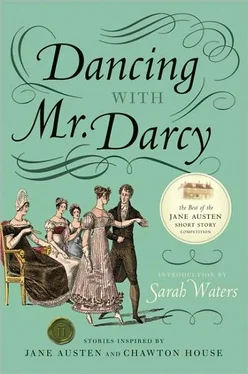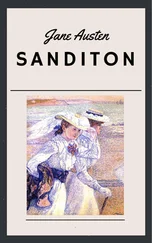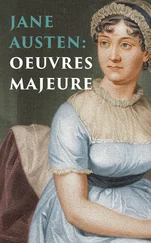Laughter exploded from the side of the dance floor. Hannah turned to see a man and woman unsuccessfully attempting to compose themselves, doubling up with further laughter whenever they looked up at one another.
‘Who is that?’ asked Hannah.
‘That is dearest Lizzy and Mr Darcy. They are no doubt attempting their scene where Mr Darcy refers to her as “tolerable” which they both find most amusing.’
‘Mr Darcy!’ exclaimed Hannah.
‘You have already made the acquaintance of Mr Darcy?’ asked Miss Bennet very politely.
‘Oh no,’ said Hannah, ‘but a lot of my friends have worked with him. He’s a very popular hero just now, after the Andrew Davies adaptation of Pride and Prejudice in 1995 and the subsequent Bridget Jones novels. Oh, Miss Bennet, what’s wrong?’
Miss Bennet had started to frown.
‘It is nothing, Miss Peel, only that my poor Mr Bingley suffers a little for Mr Darcy’s popularity. CAST does not have so much work for Mr Bingley.’
‘But Mr Darcy is every woman’s ideal man, Jane. Aren’t you secretly disappointed that you don’t end up with him?’
Miss Bennet shook her head firmly.
‘Mr Bingley singles me out from the start of our acquaintance and, as soon as he is sensible of my returned feelings, he proposes marriage to me. But I am not sure that Mr Darcy is always so good a man until Lizzy speaks to him of his improper pride.’
Hannah considered this and said, ‘Maybe that’s why Mr Darcy is always getting shadowed? Because he gets his act together after Lizzy gives him what for? Gives women authors and readers some belief that they can turn their men about, doesn’t it? But Bingley’s already an all-round decent bloke from the start.’
Miss Bennet laughed and asked, ‘What do you need to learn from me, Miss Peel?’
‘Well, like you I’m very attractive and good but, at the moment, stuff sort of just happens to me. My bloke loves me from the start. He proposes and we get married. I get scouted as a model but, I dunno, I don’t like it much. I feel just like a coat hanger. I want to have a baby but I’m not sure I get the chance in the novel to tell my husband about what I really want from him.’
Miss Bennet nodded quickly, ‘Yes, if Charlotte Lucas had spoken to me, as she does to Lizzy, of the need for me to make my feelings for Mr Bingley plainer, then I do not believe it would have been so easy for others to convince him of my indifference. And we would have wed within the first quarter of the novel—’
‘Miss Bennett, would you mind if I take notes?’ asked Hannah who now sat poised over a notebook with pen.
‘Shall I speak slowly for you, Miss Peel?’
‘It’s okay. My bloke, Bill, is a super-duper journalist and he’s been teaching me shorthand when our author’s been asleep. So I should be able to keep up. I’ve already got up to 100 words a minute.’
Miss Bennet continued, ‘It is Mr Darcy who returns Bingley to me after conveying my true feelings for him. And Mr Darcy has them from dear Lizzy. So my happiness rises and falls with Mr Darcy’s perceptions of my character. That is rather hard. But I am very blessed at the end of the novel, securing not just my own happiness but also that of my dear family. For you know that until Lizzy and I marry so happily, there is an entail which hangs over us all? My father’s death would have left Mama and my sisters in difficult circumstances if we had married otherwise. Does your marriage please your family?’
‘Yes. Like your mum with Bingley, my mum is quick to invite my bloke into our house. He’s only 15 and a runaway when we all meet so he lives with me and my parents. He’s not like Bingley because when he turns up he’s dirt poor, but he’s got brains and earning potential. My parents don’t care much about the cash. But we’re a close family. They like having Bill grow up under the same roof as me. They believe it’ll be a safe way for me to fall in love.’
Miss Bennet sighed and said, ‘Your parents are perhaps more sensible than my dear father to family responsibilities. I am afraid he learns a very hard lesson when Lydia elopes with Wickham after he fails to heed or check her nature. She is but 15 when she meets Wickham and lacking the prudence brought about by living within loving constraints.’
Suddenly, Miss Bennet smiled, ‘Miss Peel, is your man to come and shadow Mr Bingley?’
Hannah shook her head, ‘I’m afraid not, Jane. My fella turns out to be rather messed up.’
Miss Bennet said, ‘And so that is why you are to go to Thornfield Hall? To shadow Miss Eyre and her poor Mr Rochester?’
When Hannah arrived at Thornfield Hall, Jane Eyre was away from home. Mrs Fairfax invited her into a small, snug room.
‘That’s Grace Poole,’ said Mrs Fairfax gesturing towards a woman sitting at a round table by the fireplace, rapidly shuffling a pack of cards.
‘Do you play, Miss—?’
‘Peel,’ said Hannah, ‘I’m Hannah Peel, here to shadow Jane Eyre.’
‘And this is Bertha.’
A tall, sad woman turned from the fire, which she stirred with a poker. She extended a nail-bitten hand to Hannah and said, ‘Welcome to Thornfield. How long are you to stay with us here?’ [4] Before anyone contacts the CAST hotline to report Bertha for contravening the Acting Out Of Character Act, it is essential to remember that Bertha is of course Bertha Antoinette of Rhys vs Cosway MasonRochester. It took 27 years of legal dispute between author Jean Rhys and CAST, before Wide Sargasso Sea could be made public. And of those 27 years, it took Rhys the final nine to gain Bertha Antoinette’s full cooperation. Francis Wyndham refers to this on p10 of her introduction to Wide Sargasso Sea (London: Penguin, 1966): ‘For many years, Jean Rhys has been haunted by the figure of the first Mrs Rochester – the mad wife in Jane Eyre. The present novel – completed at last after much revision and agonised rejection of earlier versions – is her story.’
An alarm sounded.
‘Goodness, that startled me!’ exclaimed Bertha Antoinette, ‘Come on, Miss Peel. It’s another fire alarm.’
The characters exited the house and waited in the drive for the siren to stop. Adele, Sophie and Leah were already outside. Grace Poole smoked a cigarette and Adele skipped around them all, breathlessly singing ‘ Sur le pont d’Avignon’ .
‘Is it a real fire?’ asked Hannah.
‘I doubt it, Miss Peel,’ said Mrs Fairfax, ‘it is most likely a test. Mr Rochester thought it best to put in a system so that none of us gets hurt.’ [5] All members of the Characters’ Affiliation live in the ‘continuous present’. This state is explained by Mother on p63 of Luigi Pirandello’s Six Characters in Search of an Author when she says, ‘No, it’s happening now, it’s happening all the time! My torment isn’t over. I am alive and constantly present at every moment of my agony, which keeps coming back, alive and constantly present.’ (Translated by Stephen Mulrine, London: Nick Hern Books, 2003) Mr Rochester installed a robust fire safety system at Thornfield Hall in order to safeguard the characters from any fire-related injuries, excepting those demanded by the plot.
At that moment— [6] I’m sorry to interrupt again with another footnote but I thought perhaps it was only fair to give the characters’ side of the Pirandello Uprisings as I did bring up Pirandello in the previous footnote. This unhappy affair is a very rare instance of insurrection amongst the Characters’Affiliation. Although characters are, of course, used to working with mentally unstable authors and usually deal with them with consummate professionalism, the Pirandello Six, as they came to be known, accused the playwright of characterism. The characters felt that even the very title of the play implied that characters have no lives of their own except those given validation by authors. The Pirandello Six protested by intentionally making themselves unknowable. This is described by the play’s first director, Dario Niccodemi, in his memoir Tempo Passato (Milan:Treves, 1929, pp 82-3):‘The actors were still somewhat lost. They were unable to form an opinion about what they were saying. And this just cannot be. An actor without an opinion about the work he’s performing in is like a lamp that has gone out.’ Pirandello further angered the characters by insisting that the struggling actors ‘must no longer be actors but the very characters of the play they are performing in’. (ibid. p87) The Pirandello Six felt that this command threatened the autonomy of fictional civilians. The result of this stand-off is described by Jennifer Lorch in Six Characters in Search of an Author: Plays in Production (Cambridge: Cambridge University Press, 2005, p.31):‘The reaction to the first night of Six Characters in Search of an Author has made of it a theatrical legend: scuffles in the theatre and a hasty exit by Pirandello and his daughter by the stage door thence to be bundled into a taxi by friends.’ Anyway, back to Thornfield Hall…
Читать дальше












